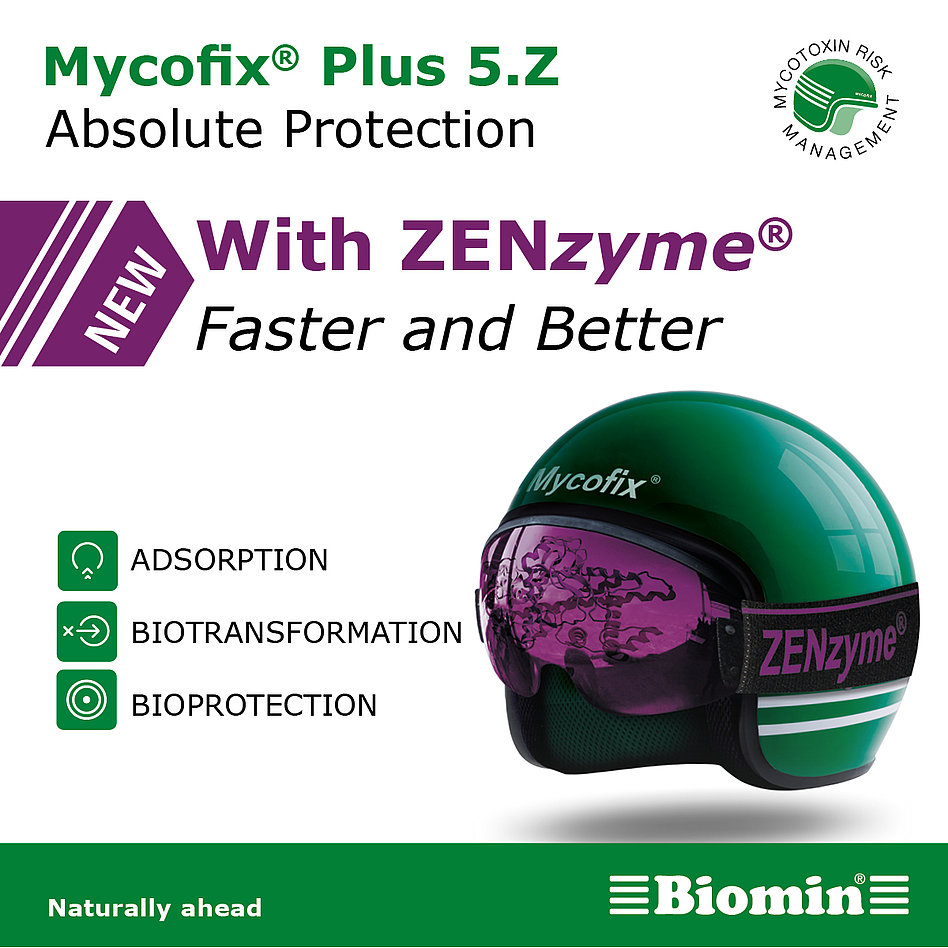Leading animal nutrition and feed additive firm BIOMIN has launched its newest mycotoxin risk management solution, Mycofix Plus 5.Z with ZENzyme, in select markets across the Asia Pacific region.
Mycofix Plus 5.Z with ZENzyme is an innovative, all-in-one feed additive providing next-generation mycotoxin risk management for breeding animals and their offspring.
ZENzyme is the first and only purified enzyme that degrades zearalenone (ZEN) fast, specifically and irreversibly into non-toxic and non-estrogenic metabolites.
With the introduction of ZENzyme into the Mycofix range, we raise the bar once again in terms of state-of-the-art protection against mycotoxins for our customers.
Ursula Hofstetter, Head of Global Product Management Mycotoxins at BIOMIN
ZENzyme offers the animal protein sector full and complete protection against zearalenone. With consistent and proper application, farmers will have the confidence that their animals will not face ZEN-induced reproduction or health challenges
Franz Waxenecker, Managing Director of BIOMIN
Threat of zearalenone in animal feed
Zearalenone, a naturally-occurring toxin produced by fungi, commonly contaminates crops including corn (maize), wheat and soy at potentially harmful levels according to the BIOMIN Mycotoxin Survey, the longest-running and most comprehensive data set on mycotoxin occurrence in the world.
The chemical structure of zearalenone poses two challenges to the agriculture sector. First, the mycotoxin latches onto an animal’s estrogen receptor which can induce hyperestrogenism and lead to reproductive problems and impair animal performance. Second, conventional binders such as clay or yeast-based products have only limited effectiveness in mitigating zearalenone’s negative impacts.
Innovative technology
Because binders are not sufficient against zearalenone, other techniques are needed. That is why BIOMIN has pioneered the field of mycotoxin mitigation using enzymatic biotransformation, beginning with the introduction of FUMzyme —the world’s first-ever commercially available mycotoxin-deactivating enzyme that degrades fumonisins — in 2013.
Enzymatic biotransformation involves enzymes designed to specifically target a mycotoxin and detoxify the fungal metabolite irreversibly, thus protecting animals from potential harm. The Mycofix range of feed additives is the only mycotoxin solution on the market that includes purified mycotoxin-degrading enzymes, namely: FUMzyme and ZENzyme, as well as a mycotoxin-degrading microorganism, BBSH® 797, for the degradation of trichothecene mycotoxins
“Over the years we have invested considerably in technologies to counteract mycotoxins, and many of these novel technologies have achieved EU authorizations for their scientifically proven safety and efficacy,” explained Ms Hofstetter. “While we have had some success in counteracting zearalenone in the past, ZENzyme is quite simply faster and better than any other technology available.”
Poultry
In poultry, zearalenone affects egg quality and can increase embryonic mortality leading to reduced hatchability. Zearalenone also affects feathering and can cause polycystic ovary syndrome. Continued or repeated exposure of birds to zearalenone through feed can have lasting long-term effects.
“If we look at egg production in particular we see that on average across studies exposure to zearalenone over a long term can reduce egg production by about 6%,” noted Professor Todd Applegate, Head of the Department of Poultry Science at the University of Georgia in the United States.
“As far as susceptibility, the turkey is very susceptible to these chronic exposures followed by broiler breeders then layers, ducks and lastly broilers. So, with chronic exposure especially during that pullet phase of rearing we’re seeing delays in reproductive tract development. Those birds may not peak as well in production and may not have persistency of lay over the long term,” observed Prof Applegate.
For poultry breeders and laying hens, Mycofix Plus 5.Z with ZENzyme guards against mycotoxin-related issues and zearalenone-induced reproductive challenges.
Swine
The negative effects of the mycotoxin zearalenone is incredibly important for swine farms, especially for breeder farms, when it comes to animal health and economic outcomes. In pigs, zearalenone is responsible for vulvovaginitis, an estrogenic syndrome not only in reproductively active swine but also in pre-pubertal gilts and even piglets.
According to Dr Veronica Nagl, Scientist at BIOMIN, “In pregnant sows, zearalenone increases the occurrence of abortions and still births. Zearalenone exposure in sows subsequently affects the health of the newborns. So here we see a higher percentage of weak born piglets with splay legs or trembling and also signs of hyperestrogenism. In boars, zearalenone results in decreased sperm quality and reduced libido.”
For sows, gilts, piglets and boars, Mycofix® Plus 5.Z with ZENzyme guards against mycotoxin-related issues and zearalenone-induced reproductive challenges.
Ruminants
Zearalenone reduces reproductive efficiency in dairy and beef cattle, which can result in fewer calves being born, false heats, uterine prolapse, ovarian cysts, unsuccessful insemination or abortions.
While it is sometimes stated that ruminants have a natural means to degrade mycotoxins due to their unique digestive systems, this is clearly not beneficial for the animals in the case of zearalenone.



